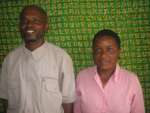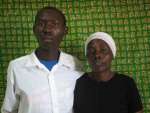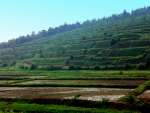Nyirasamaza Anunciata & Byiringiro Alexis
Nyirasamaza Anunciata and Byiringiro Alexis discuss their family's history, including why Byiringiro Alexis has never met his father, how Nyirasamaza Anunciata met her first and second husband, and what it has meant for both of them that she was widowed. Their loss as a family because of the 1994 genocide and the effects it has had come to the forefront and are openly discussed between mother and son. Byiringiro Alexis admits that he struggles seeing the purpose of continuing his education and asks his mother why he has faced such difficulties in his life.
Bubanje Rosalie & Rudasingwa Lorette
Rudasingwa Lorette and her mother, Bubanje Rosalie, discuss the secrets to a successful marriage. Rudasingwa Lorette has recently gotten married and admires her parents' marriage and asks her mother how she can recreate the success they have had in remaining together. Bubanje Rosalie offers her advice about keeping a happy household through mutual respect between spouses and similar expectations in marriage.
Niyonteze Olive & Uwamurera Yvone
Uwamurera Yvone asks her step-sister, Niyonteze Olive, to tell her about their family’s past. How did their father die in the genocide and how Uwamurera Yvone’s mother was left without inheritance. How Niyonteze Olive worked as a domestic worker, preserved herself, and was able to improve her life. Uwamurera Yvone wants to know how the family will take care of her in the future. Niyonteze Olive reminds her of the support that exists from her grandmother and other relatives, and advises her to be patient.
Habineza Pascal & Irakarama Joselyne
Irakarama Joselyne’s uncle, Habineza Pascal, is passionate about the value of a cow, and enthusiastically answers all of her questions regarding this Rwandan culture. Although she already understands the benefits of a cow, she does not fully understand the value of a cow. Irakarama Joselyne wants to know the reason why dowry is almost always done with a certain number of cows, and her uncle explains the significance of this transaction. He even touches upon an example of a government program called “one cow per family,” a system that helps fight poverty and malnutrition.
Mukamana Theopista & Umuvandimwe Marie Claire
Umuvandimwe Marie Claire looks up to Mukamana Theopista, and wants to hear about her friend's past in order to learn from her. When asked about what “was your happiest moment and what was your saddest moment,” Mukamana Theopista discusses growing up in poverty and moving through many tragedies into a positive present. She thanks God and her loving husband for supporting her through house fires, illness, and lost children. She encourages Umuvandimwe Marie Claire to be thankful for what she has and to have faith that she will have a good partner and strong marriage.
Gahongayire Chantal & Mzagisenga Salima
Sweeping very early in the morning used to be a girl’s task, and girls also hid themselves from the sight of others. Mzagisenga Salima is curious to hear from her mother these and other stories from Rwandan culture. Were they really schooled separately? Did boys mainly hunt? Gahongayire Chantal fills in these gaps, speaking not only about her own girlhood, but her mother’s as well. Mzagisenga Salima asks for more stories. Family stories about Mzagisenga Salima’s mother are told about a close mother-daughter bond, and about her grandmother’s great value for getting support from other women.
Mukakayonde Anna & Nyiranzeyimana Solange
Nyiranzeyimana Solange comes to storytelling discontented about her life, wondering why she was left alone. Because she is young, she only knows the life she has right now, and cannot compare it to any other life, like the one during the genocide, and before. Could there have been a better life than this one, she asks her elder? Mukakayonde Anna works very hard to convince Nyiranzeyimana Solange that right now life is much better than before. In the same breath that she tells Nyiranzeyimana Solange that her relatives died in the genocide, she tries to bring hope.
Bankundiye Albertine & Nyinawumuntu Violette
With a focus on the importance of kindness and acceptance, Bankundiye Albertine tells her friend Nyinawumuntu Violette about her family’s past. She talks about her father, an educated man who was killed in the genocide, who would take children off the streets and help them get into schools. His good deeds and reputation inform Bankundiye Albertine’s actions and continue to keep her safe. She also mentions her challenges with her mother’s side of the family. Nyinawumuntu Violette offers consolation and advises Bankundiye Albertine to be loving towards her family and they will love her back.
Kabatesi Donatha & Kabatesi Binta Samantha
Binta Samantha asks her aunt, Kabalesi Donatha, to tell the story of her life so far. She learns that, while the aunt’s parents loved her, they could not easily support her love for school. So she married, but the marriage was difficult and ended, while health problems followed. But Kabalesi Donatha found that her faith was a great source of guidance to her, and she wishes to pass on this to her niece. Binta Samantha puts her dilemmas squarely to her aunt—that the life of a young person is full of temptations, especially when the yearning in Rwanda is so much for life!
Mukakarangwa Sarah & Ntamigemo Elias
Living in exile, Mukakarangwa Sarah was 15 when she was obligated to get married to a 28 year-old. After returning to Rwanda, Sarah found that her native country faced serious threats to its security and stability like ethnic political groups and divided ethnic populations. Sarah's life was further complicated by her in-laws' attempts to force her husband to remarry within his ethnic group and later her husband's death just weeks before Ntamigemo Elias' birth. Having survived the genocide she relies on her love for her children and her hopes for unity and reconciliation to keep her going.


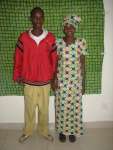
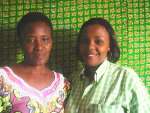
.thumbnail.JPG)
